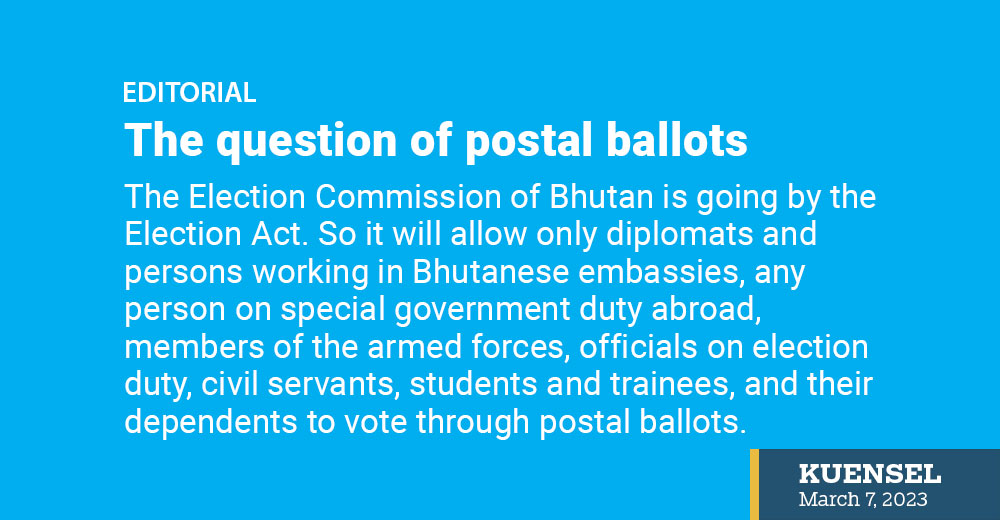The Election Commission of Bhutan is going by the Election Act. So it will allow only diplomats and persons working in Bhutanese embassies, any person on special government duty abroad, members of the armed forces, officials on election duty, civil servants, students and trainees, and their dependents to vote through postal ballots.
An exception is made for employees of Druk Holding and Investments (DHI) and journalists covering the NC elections.
The ECB’s decision is likely to affect voter turnout.
Aspiring candidates and voters alike feel that a liberal postal ballot facility and PB facilitation booths could encourage better voter turnout. Their apprehensions stem from the fact that postal ballots can decide the fate of a candidate or a constituency.
Postal Ballots are the easiest way to cast vote and are effective, too. But it could also be expensive for the State and, in the face of mounting challenges in the economy, it might seem their decision befits the need of the time.
ECB officials say that citizens have the right to cast their votes at designated polling stations in their constituencies. “Voting at a polling station provides voters not only the opportunity to connect with one’s constituency but also enables one to assess the ground realities and better understand the issues, concerns, and challenges in the constituency prior to making an informed choice,” an official said. That may be the case, but for most voting in person, it incurs a cost, which could be the biggest barrier.
How will the ECB ensure voters go to the polls? A voter might be conscious of his fundamental duties but having to travel to Trashiyangtse to cast the vote and then return to Thimphu could be very cumbersome. Then with schools in full swing, there are arrangements to be made to look after children. Parents who have no alternative will choose their children’s safety and education over voting.
With postal ballots and mobile booths, the third National Assembly elections became the most inclusive yet and drew a record total voter turnout of 71.46 percent. The turnout was an increase of more than five percent from 66 percent in the 2013 general elections.
Some even are worried about vehicle accidents that could happen whole going to vote in far-off dzongkhags. The bigger worry is if the candidates and their supporters sponsor travel for the voters, it could lead to the unnecessary hassle for voters and challenges in monitoring.
Those working in State-Owned Enterprises (SOEs), the private sector, NGOs, and those living abroad feel disenfranchised; thousands working in these sectors will have to vote in person.
The question many are asking today is whether they will have the resources, given the severe impact of the Covid-19 on businesses and soaring inflation, to go the villagers or constituencies cast their votes.
For equity sake, is it time we embraced digital technology or online voting system to ensure that each Bhutanese is given equal opportunity to exercise their adult franchise irrespective of social or economic status.
That, by definition, would be called true democracy.


